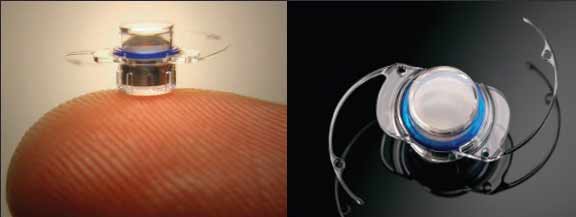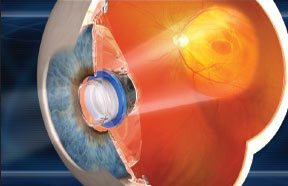END-STAGE AMD
The macula is the central part of the retina in the eye and allows for 20/20 vision. When an individual has an eye condition called end-stage AMD (age-related macular degeneration), their macula is damaged, making it difficult or impossible to read, drive, identify faces, recognize details or colors, etc. End-stage AMD is associated with permanent loss of central vision and is the primary cause of blindness in individuals over age 65.
Close to two million Americans have advanced AMD and around 11 million have some form of AMD. This figure is expected to double by 2050. No cure is available for end-stage AMD.
TREATMENT WITH THE IMPLANTABLE MINIATURE TELESCOPE (IMT)
Though no cure exists for end-stage AMD, there is one FDA-approved surgical procedure that has been recognized for improving vision in patients with this condition.  The procedure involves the use of an implantable miniature telescope (IMT) or telescope implant, in conjunction with a patient-care program developed by VisionCare Ophthalmic Technologies called CentraSight. The implant is simply a small telescope that is placed in the eye to magnify and improve vision for individuals with end-stage AMD. The natural lens of the eye is removed prior to the telescope implant being positioned. The implant usually cannot be noticed after the procedure due to its size; when noticed, it usually is said to resemble a gleam or sparkle in the eye.
The procedure involves the use of an implantable miniature telescope (IMT) or telescope implant, in conjunction with a patient-care program developed by VisionCare Ophthalmic Technologies called CentraSight. The implant is simply a small telescope that is placed in the eye to magnify and improve vision for individuals with end-stage AMD. The natural lens of the eye is removed prior to the telescope implant being positioned. The implant usually cannot be noticed after the procedure due to its size; when noticed, it usually is said to resemble a gleam or sparkle in the eye.
The outpatient surgical procedure is performed in one eye and generally is completed in under an hour. Eye drops will be given to the patient to be used in the weeks post-procedure. It is crucial that patients follow the instruction of their vision health care team after surgery and complete all suggested exercises. The rehabilitation therapy and follow-up care succeeding surgery are vital for adapting to the new changes in the individual’s vision. Patients usually notice significant, positive changes in their vision just a couple months after the procedure.
Dr. Pandit is one of a limited group of surgeons trained in this unique procedure across the country. This surgery caught the attention of Fox news health reporter Melissa Wilson and he was interviewed on live television about this procedure in 2018 (click on video on right). An accompanying patient story was aired in Houston several times in early 2018. An example of his surgery can be seen here.
 Many patients have said the telescope implant gives them back their freedom. They feel better able to participate in the day-to-day activities they were once able to do independently. They generally experience less frustration than they did with their vision prior to surgery, and they are able to identify the faces of friends and family, cook, and look after themselves with greater ease.
Many patients have said the telescope implant gives them back their freedom. They feel better able to participate in the day-to-day activities they were once able to do independently. They generally experience less frustration than they did with their vision prior to surgery, and they are able to identify the faces of friends and family, cook, and look after themselves with greater ease.